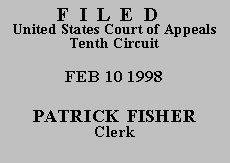

| UNITED STATES OF AMERICA,
Plaintiff-Appellee, Defendant-Appellant. |
No. 97-3279
(D.C. No. 96-20055-01) (D. Kan.) |
John Lee McPherson, Jr. appeals pro se from an order denying his motion for sentence reduction or modification. We dismiss for lack of jurisdiction.
Mr. McPherson pled guilty to one count of bank robbery in violation of 18 U.S.C. § 2113(a). In the plea agreement, the government recommended a sentence of 30 months. The district court imposed a sentence of 36 months, which was within the applicable guideline range of 30-37 months. On July 10, 1997, Mr. McPherson filed a motion for a reduction or modification of his sentence asserting he should have received the 30 months recommended by the government in the plea agreement. By order entered on August 11, 1997, the district court denied Mr. McPherson's motion on the grounds that it lacked the authority to modify his sentence under Rule 35 of the Federal Rules of Criminal Procedure or 18 U.S.C. § 3582, and that the plea agreement was not binding on the court. Mr. McPherson filed a notice of appeal on September 17, 1997.
It is well-established that an appellate court acquires jurisdiction over an appeal only upon the timely filing of a notice of appeal and that this requirement is mandatory and jurisdictional. See United States v. Ibarra, 920 F.2d 702, 704 (10th Cir. 1990), vacated on other grounds, 502 U.S. 1 (1991). Rule 4(b) of the Federal Rules of Appellate Procedure provides that in a criminal case a defendant must file a notice of appeal within ten days after the entry of the order appealed from. It also allows thirty additional days to file a notice of appeal if the appellant successfully moves the district judge to find the delay in filing is due to "excusable neglect." See Fed. R. App. P. 4(b); United States v. Leonard, 937 F.2d 494, 495 (10th Cir. 1991). Mr. McPherson appeals from the district court's August 11 order and filed his notice of appeal on September 17, well past the ten- day time limit. Mr. McPherson never requested a thirty-day extension to file due to excusable neglect. Mr. McPherson's notice of appeal is untimely and we do not have jurisdiction to hear this appeal.
DISMISSED. The mandate shall issue forthwith.
ENTERED FOR THE COURT
Stephanie K. Seymour
Chief Judge
*.This order and judgment is not binding precedent, except under the doctrines of law of the case, res judicata, or collateral estoppel. The court generally disfavors the citation of orders and judgments; nevertheless, an order and judgment may be cited under the terms and conditions of 10th Cir. R. 36.3.